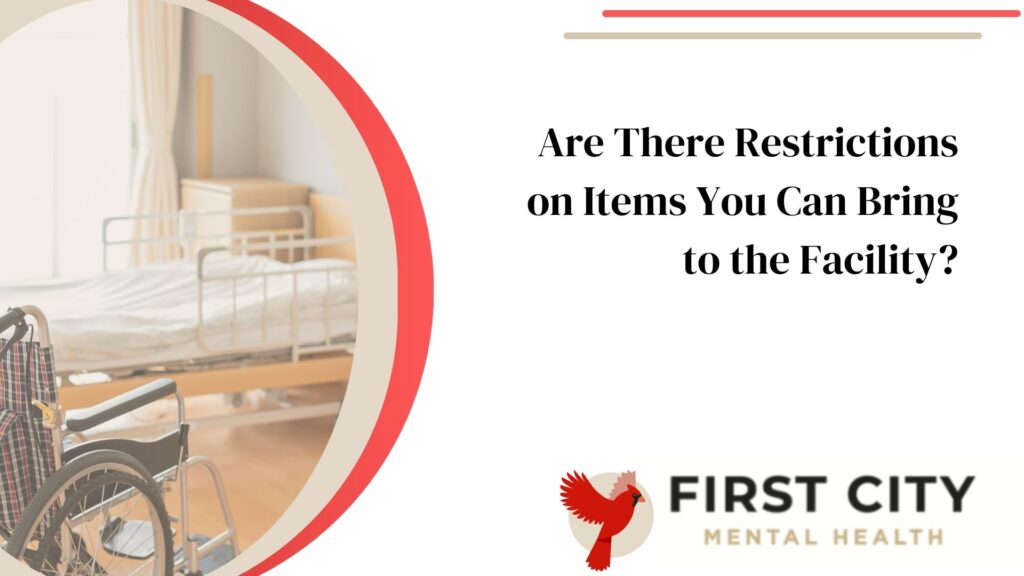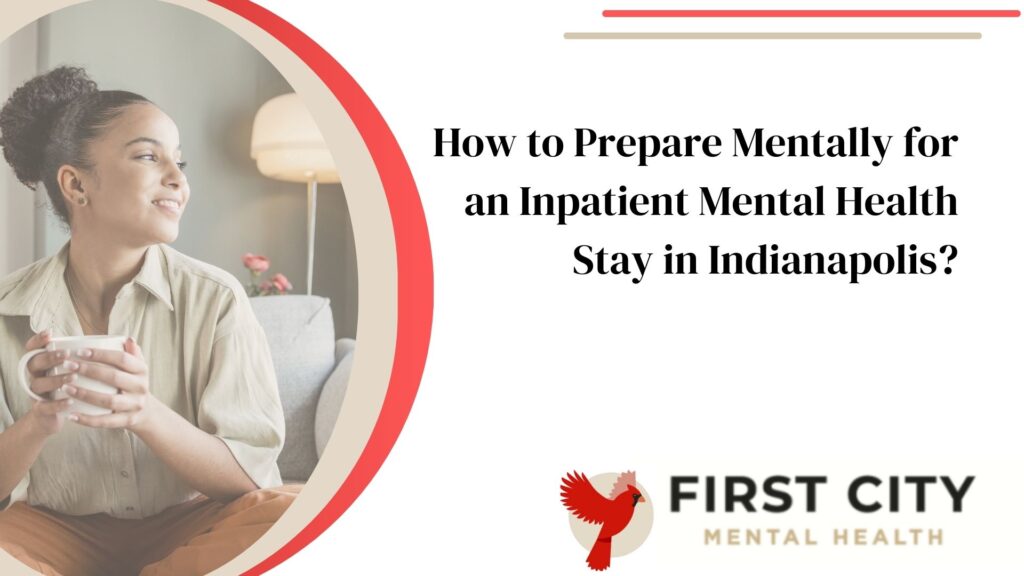
Who Qualifies for Inpatient Mental Health Care in Indianapolis?
January 14, 2025
How Does Residential Mental Health Treatment Work in Indianapolis?
January 14, 2025Getting ready for an Indianapolis inpatient mental health stay can feel overwhelming. Many people in Indianapolis face this challenge, unsure of how to prepare. One key fact is that understanding your treatment plan before entering an Indianapolis inpatient mental health facility can make a big difference.
This offers guidance on what to pack, restrictions on items you can bring, and how to get ready mentally and financially for your stay. We cover the essential steps from packing personal items to setting up a support system before your admission.
Learn what you need for a smoother experience at one of the best inpatient mental health facilities in Indiana. Keep reading for helpful tips.
Key Takeaways
- Pack essential items like personal identification, insurance information, comfortable clothing, personal hygiene products, and any current medications for your inpatient mental health stay. Include a notebook and pen for therapy sessions or notes.
- Understand the restrictions on what you cannot bring to the facility, such as sharp objects or certain electronic devices. Every patient’s safety guides these rules.
- Gather necessary documents before admission including government-issued ID, medical records, consent forms, emergency contacts, and financial information regarding responsibility for costs associated with the stay.
- Informing your employer about your mental health stay might benefit work arrangements. Open communication can create understanding and support during this challenging time.
- Setting up a strong support system involves informing family members and friends about your upcoming admission and discussing expectations with them to foster empathy and assistance throughout recovery.
What Should You Pack for an Inpatient Mental Health Stay in Indianapolis?
Packing for an inpatient mental health stay in Indianapolis requires careful thought about what will help you feel comfortable and supported. It’s essential to include items that align with the facility’s guidelines while also considering the duration of your stay, often 7 to 10 days for conditions such as depression or anxiety.
- Personal identification and insurance information – Inpatient mental health Facilities in Indianapolis often need these documents right at check-in.
- Contact list of family and friends – Having phone numbers handy ensures you can stay connected with your support network.
- Comfortable clothing – Pack enough outfits for a week, focusing on comfort and ease of wear.
- Personal hygiene products – While some facilities may provide basic items, bringing your own can make you feel more at home.
- Notebook and pen – These are useful for jotting down thoughts or during therapy sessions.
- Photos of loved ones – They can serve as a comforting reminder of support outside the facility.
- Any prescribed medication – Bring current medications along with dosing instructions from your doctor.
- A small amount of cash – For vending machines or small purchases within the facility, if allowed.
- List of questions for staff – Helps ensure you don’t forget to ask important questions about your treatment plan.
Understanding your treatment plan is critical, so including a notebook to record details and any changes discussed during your stay can be invaluable.
Are There Restrictions on Items You Can Bring to the Facility?

While packing essentials for a stay at an inpatient mental health in Indianapolis, it’s vital to know about item restrictions. Facilities have rules to ensure safety and support recovery.
You can’t bring items that might be harmful or disrupt the healing environment. This includes sharp objects, certain electronic devices, and substances not prescribed by your treatment team.
Safety and support guide our restrictions on personal items.
Every patient’s welfare is paramount during their time at adolescent inpatient mental health facilities in Indiana or any adult psychiatric unit. Reviews of these policies help maintain a balance between comfort and security, aiming for the best outcome for everyone involved.
What Documents Are Needed for Admission to an Indianapolis Facility?
Transitioning from the restrictions on items you can bring, understanding the required documents for admission is essential. Gather these necessary papers for a smooth entry into the best inpatient mental health facilities in Indiana.
Identification: Bring a government-issued ID, such as a driver’s license or passport. This document verifies your identity and is essential for enrollment.
Insurance Information: Provide details of your health insurance plan. Ensure you understand what services the insurance covers during your stay at inpatient mental health treatment programs.
Medical Records: Have copies of relevant medical records ready. Include notes from previous doctors or therapists, which detail your mental health history and any treatments you’ve undergone.
Consent Forms: Sign consent forms that allow healthcare providers to access your information and share it with necessary staff members during your stay. This ensures continuity of care while in an inpatient setting.
Emergency Contacts: Prepare a list of emergency contacts, including family members or friends who can be reached if needed. This contact list helps ensure communication during your stay at the facility.
Treatment Plan Documents: If applicable, bring any existing treatment plans from current mental health professionals. Understanding your treatment goals will aid the staff in providing appropriate support at the Indiana facility.
Admission Referral Letters: If you have them, include letters of referral from healthcare professionals recommending inpatient care for you or outlining specific needs during admission.
Financial Information: Prepare documentation regarding financial responsibility for costs associated with the inpatient stay, including co-payments or deductibles required by insurance providers.
Legal Documentation: If you have any legal guardianship papers or advanced directives related to healthcare decisions, bring these along to facilitate appropriate care and respect for your wishes during hospitalization.
Should You Notify Your Employer About Your Inpatient Mental Health Stay?
Notifying your employer about your inpatient mental health stay can be beneficial. Open communication creates understanding and support during this challenging time. If you decide to inform them, share essential details without oversharing personal information.
Adolescent inpatient mental health facilities in Indiana often require patients to focus on their recovery for 7 to 10 days, which might affect work commitments.
You may worry about job security or the stigma surrounding mental health issues. Many employers recognize the importance of mental well-being and offer support systems. Addressing this topic can help set boundaries and ensure a smoother transition back to work after treatment at one of the adolescent inpatient mental health facilities in Indiana.
How to Prepare Mentally for an Inpatient Mental Health Stay in Indianapolis?

Preparing mentally for an inpatient mental health stay in Indianapolis requires a proactive approach. Understanding your treatment plan is crucial. Discussing this with your mental health professionals can help clarify what to expect during your stay.
Patients experiencing depression, suicidal thoughts, or anxiety disorders usually spend 7 to 10 days in psychiatric hospitals. Knowing the duration of your stay can ease some anxiety about the process.
Creating a support system also plays an essential role in preparation. Inform family and friends about your upcoming admission. This communication helps build understanding and fosters empathy during challenging times.
Open dialogue about mental health crises creates a safe space for sharing feelings and concerns throughout your recovery journey at facilities like adolescent inpatient mental health facilities Indianapolis offers.
Developing healthy coping mechanisms will significantly aid in managing this period for improved well-being.
What Are the Financial Preparations for an Inpatient Mental Health Stay?
Financial preparations for an inpatient mental health stay in Indianapolis require careful planning. Patients typically spend between 7 to 10 days in psychiatric hospitals due to conditions like depression or anxiety disorders.
Understanding your insurance coverage is crucial. Check if your plan covers treatment at specific inpatient mental health facilities in Indianapolis.
Consider other costs such as co-pays and deductibles that might arise during your stay. You may need funds for personal expenses while hospitalized, including items not provided by the facility.
Clear communication with a financial advisor or social worker can simplify the process of managing costs associated with your inpatient mental health treatment experience.
How to Set Up Support Systems Before Your Inpatient Stay?
Preparing for an inpatient mental health stay in Indianapolis involves establishing a solid support system. A strong network can enhance your recovery experience and provide comfort during your treatment.
- Inform family members about your upcoming stay. This fosters understanding and support while you focus on your recovery in the inpatient mental health facilities Indianapolis offers.
- Share details with close friends who can offer encouragement. Having a few trusted individuals in your life allows for open dialogue about your feelings and experiences during this time.
- Discuss your situation with a therapist or counselor before admission. They can help you prepare emotionally and develop coping strategies to manage stress related to the inpatient mental health setting.
- Create a list of people you can contact for support during your stay. This list should include family, friends, or colleagues who are willing to listen and offer assistance as needed.
- Establish a plan for daily communication with loved ones during your hospitalization. Regular check-ins can make you feel more connected and less isolated while receiving care.
- Consider joining support groups online or in-person before entering the facility. Connecting with others facing similar challenges can provide camaraderie and shared experiences that bolster emotional resilience.
- Prepare loved ones by explaining what they can expect during your stay and how they can best support you through it. Educating them about the psychiatric hospital process may alleviate their concerns as well.
- Arrange for someone to handle responsibilities at home or work while you’re away for 7 to 10 days, as this helps reduce anxiety about leaving tasks unfinished.
- Communicate openly about any mental health crises leading up to your admission, ensuring that those around you understand the importance of honesty throughout the process.
- Schedule a meeting with key figures in your support network just before your stay, reinforcing connections and ensuring everyone is on the same page regarding their supportive roles.
These steps will help create a strong foundation of support as you prepare for admission at an Indianapolis facility focused on intensive intervention for adults experiencing psychiatric symptoms. Understanding what to expect during the admission process is essential next on this journey.
What to Expect During the Admission Process at an Indianapolis Facility?

The admission process for an inpatient mental health stay in Indianapolis is structured and thorough. Upon arrival, you will meet with a mental health professional who will assess your situation.
This meeting allows them to understand your treatment needs and discuss your personal history. Expect to answer questions about your current mental state and any previous treatments.
Open communication during this time is crucial, as it helps the staff create an effective treatment plan suited to you.
You may need to provide essential documents for admission, including identification and insurance information. The facility might also require consent forms outlining privacy policies and treatment agreements.
Be prepared for some initial paperwork before beginning your stay. Once admitted, you’ll follow a structured schedule that promotes recovery through various therapeutic activities, fostering healthy habits throughout your time at the facility.
Understanding these steps can ease anxieties as you transition into inpatient care in mental health facilities Indianapolis focused on mental health support.
Conclusion
Preparing for an inpatient mental health stay requires careful planning. Start by packing essential items like comfortable clothing and personal hygiene products. Understanding your treatment plan is key to feeling secure during your stay.
Open communication with loved ones helps build a strong support system. Consider notifying your employer about your absence to ease any concerns. Financial preparations can prevent stress while you focus on recovery.
Utilize resources available in Indianapolis, such as residential treatment centers, to explore additional options.
Taking these steps fosters a smoother transition into treatment, promoting a healthier mindset. Reflect on how these strategies will benefit you or someone you care about facing similar challenges.
Prioritizing mental health is a courageous step toward healing and growth. Seek guidance if needed; many are ready to assist on this journey toward wellness and recovery with the best inpatient mental health facilities in Indiana.
.
FAQs
What does an inpatient mental health stay involve in Indianapolis?
An inpatient mental health stay in Indianapolis involves a comprehensive program where patients receive round-the-clock care and treatment within a dedicated facility.
How can I prepare for my upcoming inpatient mental health stay?
To prepare, gather necessary personal items, understand your treatment plan, and mentally ready yourself for the journey ahead. It’s important to approach this with an open mind.
Are there specific guidelines to follow when preparing for an inpatient mental health stay?
Yes, each facility has its own set of rules but generally, you should pack essential items like clothing and toiletries while leaving behind any potentially harmful objects.
Can family members visit during an Indianapolis inpatient mental health stay?
Typically yes, most facilities have visiting hours or days but it’s best to check directly with the institution about their specific policies.






